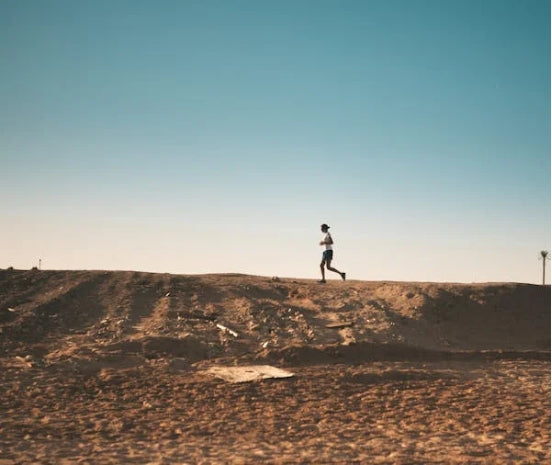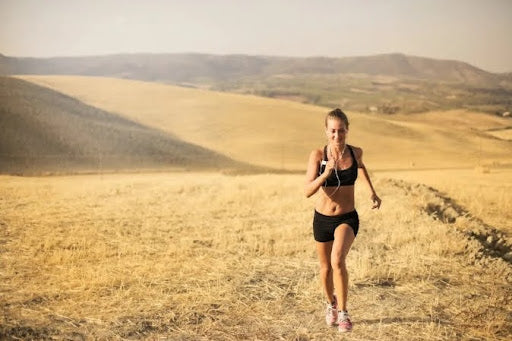I used to firmly believe that as long as I maintained a healthy diet and regular exercise, I wouldn't have to worry about hair loss.
However, a few years ago, when I was getting a haircut, the stylist pointed to my hairline and asked, "Do you often run with a ponytail? You should stop." Plus, there was a time when my scalp hurt so much while combing my hair that I actually went to see a doctor…
At that time, I was educated by a dermatologist and then I searched for various materials and found that there are more than just ponytails that can harm hair volume. Here are six points to watch out for!
- Outdoor Exercise Without Hair Sun Protection

The first time I told a friend that hair also needs sun protection, they thought they had heard wrong. The truth is, the damage that sunlight can do to hair quality is as strong as it is to the skin, and your scalp is also skin!
UVA radiation from the sun can cause hair pigment loss, while UVB can lead to the loss of hair proteins. Prolonged sun exposure can also damage the scalp and hair follicles.
If you often exercise outdoors without proper hair sun protection, your hair is more likely to become dry, fragile, prone to breakage, and even change color more easily after dyeing. It can also lead to premature graying.
You can use hair sun protection sprays, sun protection lotions specifically for hair/scalp, or simply wearing a hat is perfectly fine!
However, there is a slight issue with always wearing a hat during exercise (which we will discuss later).
- Excessive Dieting

Excessive dieting has two impacts on the body: one is malnutrition, and the other is stress.
Reducing food intake increases the risk of inadequate nutrient intake. Long-term insufficient caloric intake and rapid weight loss without proper nutrition can lead to weak hair quality.
If your body lacks iron, vitamin A, zinc, niacin, selenium, vitamin D, etc., it can lead to excessive hair loss and may even cause hair to stop growing altogether.
Additionally, many girls incorrectly reduce fat intake, fearing that eating meat will lead to weight gain, which can result in too little protein intake. Protein is a very important component of hair, and a lack of protein intake can also easily lead to hair loss and fragility. If malnourished, combined with excessive exercise and dieting stress, it can lead to increased cortisol levels and an inflammatory state in the body, making hair loss more likely.
If you start to notice large amounts of hair loss after dieting, it may be your body's alarm signal, telling you that you're eating too little and exercising too much!
- Insufficient Intake of Healthy Fats

Not eating enough fat may not lead to hair loss, but it can make hair lack luster.
Polyunsaturated fatty acids can promote hair growth, and omega-3 fatty acids can add luster to hair and help with scalp metabolism, leading to denser hair.
For example, olive oil, sesame oil, deep-sea fish, avocados, nuts, and other foods rich in fatty acids can make both skin and hair more radiant.
If you don't like avocados and nuts, and it's difficult to find deep-sea fish, hair oil is also a good choice. The fatty acids in hair oil can compensate to some extent for the lack in your diet, making your hair more radiant.
- Wearing a Tight Ponytail While Exercising
When exercising, especially with high-impact activities, avoid wearing a tight ponytail, as it can really tug at the hairline!
(In fact, I still prefer to wear a ponytail because it's really convenient.)
Wearing hair too tight can lead to traction alopecia, and if done for a long time, it can even cause irreversible damage to the hair follicles, reducing the number of local hair follicles and leading to permanent hair loss.
- Wearing a Hat Every Day During Exercise
Wearing a hat occasionally during exercise is fine! But there are issues with wearing a non-breathable hat for a long time during high-intensity exercise and excessive sweating.
Under the soaking of a large amount of sweat, a damp and stuffy scalp will secrete a lot of oil, breed harmful bacteria, and easily trigger seborrheic dermatitis, among other issues.
If you sweat a lot during exercise, it's best to choose a professional sports hat that is moisture-wicking and quick-drying, rather than a canvas baseball cap.
- Not Washing Hair After Heavy Sweating from Exercise

Our scalp, like the skin on our face, needs regular and proper cleaning to stay healthy.
If you sweat less, it's okay not to wash (for example, after a light yoga class where you only sweat a little, there's no need to wash).
But if you engage in aerobic exercise and sweat a lot, just imagine! The sweat from your body, the bacteria in the air, and the oil secreted by your scalp are all left on your hair and scalp, and cannot be cleaned properly, which can easily lead to bacterial growth, red and inflamed scalp, excessive dandruff, and even hair loss. (If you also feel pain when you touch your scalp, in addition to the hair being tied too tightly, another possibility is insufficient cleaning, bacterial infection, or scalp inflammation.)
It's best to wash your hair immediately after heavy sweating, and if you don't sweat much, those with fine and soft hair can wash every 2-3 days. Generally, the coarser or thicker your hair is, the longer you can go between washes.



